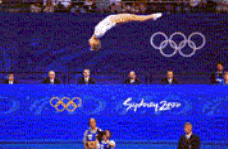Training diaries
Hope is not a strategy
Most successful athletes of almost all disciplines make use of training diaries - why do they do this? There are numerous reasons:
- They allow them to record their goals (short-, medium- & long-term) and any specific plans towards achieving them in a visual form – much better than relying on both coach and performer trying to remember the same thing;
- They should provide a record of what happened at each training session – this allows the performer and coach to keep track of what works and what doesn’t;
- They allow the performer to keep track of competition results and to understand them in the context of what has been happening at training.
What should they include?
First and foremost a date for each entry, after that the content will vary according to the occasion.
Goal Setting Tasks
“Champions aren’t made in gyms. Champions are made from .. a desire .. a vision.”
“Champions have to have the skill and the will. But the will must be stronger than the skill. When I was boxing I would set a goal for myself to demonstrate to other people what could be done, and to prove to myself that anything was possible when I set a goal then worked to achieve it. We create our own realities according to our thoughts and beliefs.”
Muhammad Ali – former World Heavyweight Boxing champion
 Setting
of goals needs to be thought through carefully if they are to empower the
performer rather than discourage them. The conundrum about ‘how do you eat an
elephant’ springs to mind as an example of a discouraging objective – the answer
of course, is ‘a bit at a time’. In the same way it is useful to establish not
just an ultimate (“I want to compete in the Olympics”) and a longer-term but
intermediate goal that still seems some way away (maybe something like “I want
to compete at FIG B by the end of next year”), it is also a good idea to have
some more immediate goals along the path such as those relating to skills and
form that will allow the real target to be achieved.
Setting
of goals needs to be thought through carefully if they are to empower the
performer rather than discourage them. The conundrum about ‘how do you eat an
elephant’ springs to mind as an example of a discouraging objective – the answer
of course, is ‘a bit at a time’. In the same way it is useful to establish not
just an ultimate (“I want to compete in the Olympics”) and a longer-term but
intermediate goal that still seems some way away (maybe something like “I want
to compete at FIG B by the end of next year”), it is also a good idea to have
some more immediate goals along the path such as those relating to skills and
form that will allow the real target to be achieved.
 It
is, of course, entirely possible to reach some targets by focussing on just one
of these but that will inevitably lead to a flawed performer who either has
great form but no tariff or high tariff but no form.
It
is, of course, entirely possible to reach some targets by focussing on just one
of these but that will inevitably lead to a flawed performer who either has
great form but no tariff or high tariff but no form.
A useful rule of thumb is that to reach the next grade requires a performer to be scoring consistent high 7s in their set routine and competing a voluntary routine nearly as tidily but as difficult as the set for the next grade. Short- term goals will therefore include improvements that will affect form scores (point toes, reach up first etc…) as well as mastering the next difficult move.
Training Record
“When you are young, your diary is a sign of progress, when you are older, your diary is an invaluable guide and motivator, and when you are old it is, at the least, a nostalgic read.”
Bruce Tulloh – former British International runner
This should contain notes about how each training session went, what did they do, how did they feel about it and what progress did they make towards their short-term goals? It is worth visiting the book after every go to make notes about, for example:
- What warm-up did they do?
- What conditioning work did they do?
- What drills, routines or skills did they work on each go?
- How did they feel it went?
- Did the coach make any particular comment to take note of?
- Did they get any ‘ticks-in-boxes’ for goals achieved (e.g. pointier toes?)
- Did they record any ‘objective’ measures such as timed bouncing?
Health & Wellbeing
“Fitness - If it came in a bottle, everybody would have a great body.”
Cher
 Health
and wellbeing, of course, affects the performer’s ability to work consistently.
Any variations from the norm, therefore, should be noted in the diary. For
example, have they got a niggling ankle, a bit of a cold or are they just
feeling plain tired - maybe they’ve had cross-country at school two days running
and their legs are just not up to it. All these variations should be noted so we
can have a context for that training session.
Health
and wellbeing, of course, affects the performer’s ability to work consistently.
Any variations from the norm, therefore, should be noted in the diary. For
example, have they got a niggling ankle, a bit of a cold or are they just
feeling plain tired - maybe they’ve had cross-country at school two days running
and their legs are just not up to it. All these variations should be noted so we
can have a context for that training session.
Competition Report
“He who makes no mistakes makes no progress."
Theodore Roosevelt
The competition itself, of course, should be what the training has been preparing the performer for, the environment however is entirely different and what might work well in training suddenly does not – or at least does not appear to – this means there are yet more learning opportunities. Important notes to make here include:
-
 What
scores did the performer get?
What
scores did the performer get? - Did they match their (or others’) expectations?
- Did they make a mistake or did they do it right?
- How did they feel about their performance and their scores?
- Where did they end up?
 ®
®









